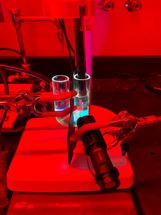FDA Approves Amgen's Aranesp™ For Anemia
Amgen (Nasdaq:AMGN) today announced that the U.S. food and Drug Administration (FDA) has approved AranespÔ (darbepoetin alfa) for the treatment of anemia associated with chronic renal failure. Aranesp requires fewer injections than the existing treatment, Epoetin alfa, which is marketed under the trade names Epogen® and Procrit® FN1,FN2.
Aranesp is indicated for the treatment of anemia associated with chronic renal failure, including patients on dialysis and patients not on dialysis.
Chronic renal failure in its early stage of disease progression is referred to as chronic renal insufficiency (CRI), and over time progresses to end-stage renal disease (ESRD), the point at which patients require dialysis or kidney transplantation.
Due to its longer serum half-life, Aranesp should be administered less frequently than Epoetin alfa, thus simplifying anemia management for patients and healthcare providers. The recommended starting dose is 0.45 mcg/kg administered intravenously or subcutaneously once weekly. Aranesp should be administered once every two weeks to patients currently receiving Epoetin alfa once per week. Additionally, some CRI patients may be treated successfully with Aranesp administered once every two weeks.
As reflected in the Biologics License Application submitted to the FDA, Aranesp has been studied in 1,598 adults with chronic renal failure for a total of 942 patient-years in 12 clinical trials conducted at sites in North America, Europe, and Australia.
Clinical studies showed chronic renal failure patients receiving AranespÔ consistently reached target hemoglobin (red blood cell) levels. The studies showed Aranesp to be generally well-tolerated. Serious adverse events were associated with increases in hemoglobin greater than approximately 1.0 g/dL during any 2-week period in patients treated with Aranesp or Epoetin alfa in Aranesp clinical trials, including increased incidence of cardiac arrest, neurologic events (including seizures and stroke) and exacerbations of hypertension, congestive heart failure, vascular thrombosis/ischemia/infarction, acute myocardial infarction, and fluid overload/ edema were observed. There have been rare reports of potentially serious allergic reactions including skin rash and urticaria associated with Aranesp. The most commonly reported side effects in Aranesp trials were infection, hypertension, hypotension, myalgia, headache, and diarrhea. Some of the adverse events reported are typically associated with chronic renal failure, or recognized complications of dialysis, and may not necessarily be attributable to Aranesp therapy. No important differences in adverse event rates between the Aranesp and Epoetin alfa treatment groups were observed in the controlled studies.
Aranesp is contraindicated in patients with uncontrolled hypertension.
"Aranesp represents the next phase of growth for Amgen," said Amgen chairman and chief executive officer Kevin Sharer. "We've used cutting-edge science to create a new molecule that retains the efficacy of Epogen® in correcting anemia associated with chronic renal failure, while adding the benefit of less-frequent dosing. We believe Aranesp simplifies the treatment of anemia associated with chronic renal failure, with potentially fewer office visits and less disruption of patients' lives."
Anemia is the shortage of oxygen-carrying red blood cells that fuel body function. Patients with impaired kidney function often suffer from anemia because their kidneys no longer produce sufficient amounts of erythropoietin, a hormone that stimulates production of red blood cells. Aranesp stimulates the bone marrow to increase the production of red blood cells, and has been shown to result in a clinically significant improvement of anemia in patients with chronic renal failure.
Topics
Organizations
Other news from the department research and development

Get the chemical industry in your inbox
By submitting this form you agree that LUMITOS AG will send you the newsletter(s) selected above by email. Your data will not be passed on to third parties. Your data will be stored and processed in accordance with our data protection regulations. LUMITOS may contact you by email for the purpose of advertising or market and opinion surveys. You can revoke your consent at any time without giving reasons to LUMITOS AG, Ernst-Augustin-Str. 2, 12489 Berlin, Germany or by e-mail at revoke@lumitos.com with effect for the future. In addition, each email contains a link to unsubscribe from the corresponding newsletter.




























































